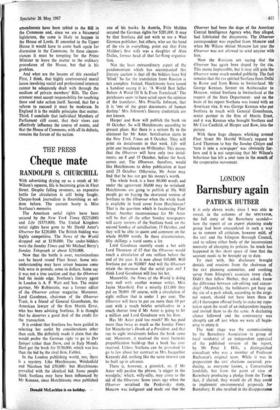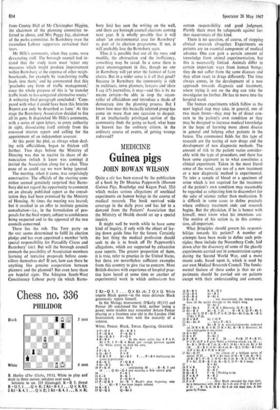Barnsbury again
LONDON PATRICK HU'fBER
It is only eleven weeks since I was able to reveal, in the columns of the SPECTATOR, the full story of the Barnsbury scandal— how the report of an expert planning study group had been emasculated in such a way as to remove all criticism, however mild, of the °Lc and the Islington Borough Council, and to relieve either body of the inconvenient necessity of changing its policies. So much has happened in this short space of time that the account needs to be brought up to date.
To start with, this disclosure brought denials and evasions from the chairman of the Gm planning committee, and soothing syrup from Islington's associate town clerk. Didn't that fellow Hutber, they asked, know the difference between sub-editing and censor- ship? (Meanwhile, the bulldozers got busy on the site of a park which, according to the origi- nal report, should not have been there at all.) I thereupon offered freely to stake my repu- tation upon the result of an independent inquiry and invited them to do the same. A deafening silence followed and the controversy was abruptly cut off just when we were all begin- ning to enjoy it.
The next stage was the commissioning by the Barnsbury Association (a group of local residents) of an independent appraisal of the published version of the report, by Mr Peter J. Hills, a distinguished consultant who was a member of Professor Buchanan's original team. While it was in preparation the Gt_c elections occurred, pro- ducing, as everyone' knows, a Conservative landslide, but from the point of view of Barnsbury producing a pledge from the Tories that, if elected, they would do all they could to implement environmental proposals for Barnsbury. It also resulted in the disappearance
from County Hall of Mr Christopher Higgins, the chairman of the planning committee re- ferred to above, and Mrs Peggy Jay, chairman of the parks committee. In Barnsbury even the staunchest Labour supporters restrained their tears.
Mr Hills's comments, when they came, were devastating stuff. The borough council had in- sisted that the study team must 'reject any measures which might produce improvement within Barnsbury at the expense of other neigh- bourhoods, for example by transferring traffic loads into them,' and he commented that this 'precludes any form of traffic management,' since the whole purpose of this is `to transfer traffic loads to less-congested alternative routes.' A withering final paragraph concluded : 'Com- pared with what it could have been this Interim Report can only be described as lame.' At this stage the Barnsbury Association decided to fire all its guns. It dispatched Mr Hills's comments, with a series of open letters, to every authority in sight, dissociating itself entirely from the censored interim report and calling for the appointment of an independent assessor.
At this point the plot, as always when deal- ing with officialdom, began to thicken still further. Two days before the Ministry of Housing was due to receive its share of de- nunciation (which it knew was coming) it invited the Association along for a chat. Thus none of us could say we were being ignored.
The meeting, when it came, was surprisingly constructive. The officials of the steering com- mittee seemed genuinely surprised that Barns- bury did not regard the opportunity to comment on an already published report as the consul- tation they had been promised by the Ministry of Housing. At times the meeting was heated; but it resulted in an offer to institute genuine consultation—i.e., in the formulation of pro- posals for the final report, subject to confidences being respected and to the approval of the two councils concerned.
There lies the rub. The Tory party on the GLC seems determined to fulfil its election pledge and has even appointed a member 'with special responsibility for Piccadilly Circus and Bamsbury' (sic). But will the borough council stomach the possibility of Association members learning of tentative proposals before coun- cillors themselves do? If not, how can there be anything like genuine cooperation between planners and the planned? But even here there are hopeful signs. The Islington South-West Constituency Labour party (in which Barns- bury lies) has seen the writing on the wall, and there are borough council elections coming next year. It is wholly possible that it will adopt 'an environmental area for Barnsbury' as part of its election programme. If not, it will probably lose the Barnsbury seats.
Thus it is possible that out of the mess and muddle, the obstruction and the inefficiency, something may be saved. In a sense there is great encouragement in this, though no one in Bamsbury will yet utter the faintest of faint cheers. But in a wider sense is it all that good? Because in Barnsbury the community is rich in architects, town planners, lawyers and (dare I say it?) journalists, it may—and this is by no means certain—be able to stop the steam- roller of officialdom and introduce a shade of democracy into the planning process. But I know how near this basically talented group has come on more than one occasion to despair. If an intellectually privileged section of the community finds the going so hard, what hope in heaven has the ordinary citizen, in the ordinary course of events, of getting wrongs redressed?



































 Previous page
Previous page